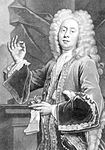The Royalist is a 1682 comedy play by the English writer Thomas D'Urfey. It was staged at the Dorset Garden Theatre by the Duke's Company, shortly before the merger that created the United Company. It is set during the Commonwealth Era following the English Civil War.
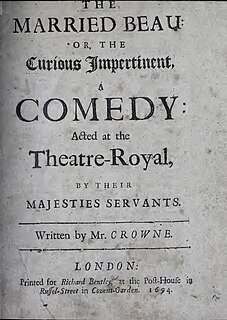
The Married Beau or The Curious Impertinent is a 1694 comedy play by the English writer John Crowne. It is inspired by a passage from Miguel de Cervantes's Don Quixote. Incidental music was composed by Henry Purcell.
Squire Oldsapp is a 1678 comedy play by the English writer Thomas D'Urfey. Staged by the Duke's Company at the Dorset Garden Theatre in London, the original cast included Thomas Betterton as Welfore, William Smith as Henry, John Crosby as Lovell, James Nokes as Squire Oldsapp, Anthony Leigh as Sir Frederick Banter, Samuel Sandford as Colonel Buff, Cave Underhill as Pimpo, Emily Price as Christina and Elizabeth Currer as Madame Tricklove.
The Country Wit is a 1676 comedy play by the English writer John Crowne, part of the tradition of Restoration Comedy. It was first staged at the Dorset Garden Theatre in London by the Duke's Company. The cast included Samuel Sandford as Sir Thomas Rash, Thomas Betterton as Ramble, James Nokes as Sir Mannerly Shallow, Henry Harris as Merry, Cave Underhill as Booby, Matthew Medbourne as Lord Drybone, Anthony Leigh as Rash, Mary Betterton as Lady Faddle, Mary Lee as Christina, Elizabeth Currer as Betty Frisque and Elinor Leigh as Isabella.
The Marriage-Hater Matched is a comedy play by the English writer Thomas D'Urfey. It was first staged by the United Company at the Theatre Royal, Drury Lane in January 1692. The original cast included John Bowman as Brainless, William Mountfort as Sir Philip Freewit, Samuel Sandford as Limber, John Hodgson as Darewell, Anthony Leigh as Myn Here Van Grin, George Bright as Bias, Thomas Doggett as Solon, William Bowen as Callow, Colley Cibber as Splutter, Elizabeth Barry as Lady Subtle, Katherine Corey as Lady Bumfiddle, Anne Bracegirdle as Phoebe, Charlotte Butler as La Pupsey and Abigail Lawson as Margery.
Sir Anthony Love; Or, The Rambling Lady is a 1690 comedy play by the Irish writer Thomas Southerne. It was originally staged by the United Company at the Theatre Royal, Drury Lane with a cast that included Susanna Mountfort in a breeches role as Sir Anthony Love, William Mountfort as Valentine, Joseph Williams as Ilford, William Bowen as Sir Gentle Golding, Anthony Leigh as An Abbe, John Hodgson as Count Canaile, Samuel Sandford as Count Verole, George Bright as Waitwell, Colley Cibber as Servant to Sir Gentle, Charlotte Butler as Floriante, Anne Bracegirdle as Charlote and Frances Maria Knight as Volante. The play's incidental music was composed by Henry Purcell.
Love For Money; Or, The Boarding School is a 1691 comedy play by the English writer Thomas D'Urfey. It was originally staged at the Theatre Royal, Drury Lane by the United Company. In 1733 it was adapted into a ballad opera The Boarding School by Charles Coffey.

A Fond Husband; Or, The Plotting Sisters also known as The Fond Husband is a 1677 comedy play by the English writer Thomas D'Urfey. It was first staged by the Duke's Company at London's Dorset Garden Theatre with a cast that included William Smith as Rashley, Henry Harris as Ranger, James Nokes as Peregrine Bubble, Anthony Leigh as Old Fumble, Samuel Sandford as Sir Roger Petulant, Thomas Jevon as Sneak, John Richards as Spatterdash, Thomas Percival as Apothecary, Elizabeth Barry as Emillia, Rebecca Marshall as Maria and Margaret Hughes as Cordelia. The published version was dedicated to the Irish statesman James Butler, Duke of Ormonde.

The Wives Excuse also The Wives Excuse; Or, Cuckolds Make Themselves is a 1691 comedy play by the Anglo-Irish writer Thomas Southerne. The title is sometimes written more grammatically as The Wives' Excuse.
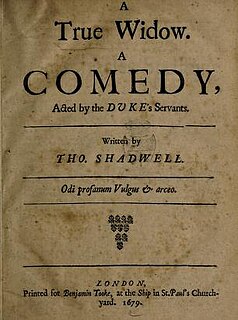
A True Widow is a 1678 comedy play by the English writer Thomas Shadwell. It was first staged by the Duke's Company at the Dorset Garden Theatre in London. The names of the original cast are unknown. The prologue was written by Shadwell's colleague John Dryden. It was published the following year and dedicated to Charles Sedley.
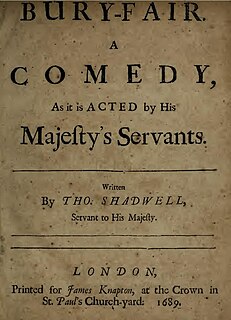
Bury Fair is a 1689 comedy play by the English writer Thomas Shadwell. It is part of the tradition of Restoration Comedy that flourished during the era. It was first staged by the United Company at the Theatre Royal, Drury Lane in London.

Love Triumphant; Or, Nature Will Prevail is a 1694 tragicomedy by the English writer John Dryden. It was Dryden's final stage play.
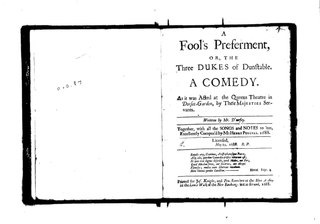
A Fool's Preferment; Or, The Three Dukes Of Dunstable is a 1688 comedy play by the English writer Thomas D'Urfey. It is a reworking of John Fletcher's Jacobean work The Noble Gentleman. It was first performed by the United Company at the Dorset Garden Theatre in London. Henry Purcell composed the play's incidental music. It was his first major work composingfor the theatre in seven years since Sir Barnaby Whigg.
Carey Perin was an English stage actor of the seventeenth century. He was a long-standing member of the King's Company based at the Theatre Royal, Drury Lane. He then joined the merged United Company in 1682. His last known role was in Thomas Southerne's The Maid's Last Prayer.
Thomas Clark was an English stage actor of the seventeenth century. He was a long-standing member of the King's Company, based at the Theatre Royal, Drury Lane in London, from 1670 onwards. He was part of the group of actors who briefly left for Edinburgh in 1679 after a dispute with the management of the company.
Mary Corbett was an English stage actress of the seventeenth century. She was a member of the King's Company, based at the Theatre Royal, Drury Lane. She appears to have left the company around the time of the merger creating the new United Company. Her name is sometimes written as Mary Corbet.

Troilus And Cressida; Or, Truth Found Too Late is a 1679 tragedy by the English writer John Dryden. It was first staged by the Duke's Company at the Dorset Garden Theatre in London. It was a reworking of William Shakespeare's 1602 play Troilus and Cressida, set during the Trojan Wars. In acknowledgement of this Dryden has the prologue spoken by Shakespeare's ghost, defending the alterations made to the play.

Sir Salomon; Or, The Cautious Coxcomb is a 1670 comedy play by the English writer John Caryll. It has often been staged under the title Sir Solomon Single. It was first performed by the Duke's Company at the Lincoln's Inn Fields Theatre in London. It is part of the tradition of Restoration comedy.
Sarah Cooke was an English stage actress of the seventeenth century. She was a member of the King's Company, based at the Theatre Royal, Drury Lane. She played a number of lead roles during the 1680s.
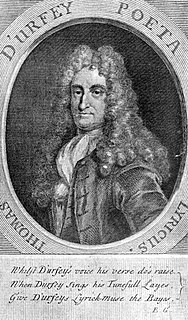
The Campaigners; Or, The Pleasant Adventures At Brussels is a 1698 comedy play by the English writer Thomas D'Urfey. It was first staged at the Theatre Royal, Drury Lane by Christopher Rich's Company.











